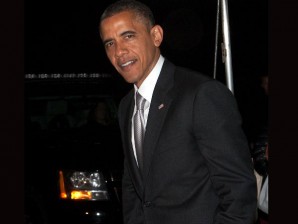Hatfield, Pennsylvania—President Barack Obama warned Friday that Republicans would give Americans a lump of coal for Christmas if they kill his plan to raise $1.6 trillion from higher taxes on the wealthy.
But the most powerful Republican in Washington, House speaker John Boehner, warned that talks on averting a year-end tax and spending crunch, which could tip the economy back into recession, were going nowhere.
Obama traveled to a toy factory in Pennsylvania to press his case for a plan to stop the US economy tipping off a “fiscal cliff” when automatic tax hikes and spending cuts come into force on January 1.
Republicans have rejected Obama’s first offer to end the stalemate as “ridiculous” and negotiations between the two sides have hit a roadblock with just a month to go, punctuated by the holiday season, until the deadline.
“The sooner Congress gets this done, the sooner our economy will get a boost,” Obama said, pushing his plan to extend tax cuts for the middle class but to raise rates on American families earning $250,000 or more.
“If Congress does nothing, every family in America will see their income taxes automatically go up on January 1,” Obama said.
“That’s sort of like the lump of coal you get for Christmas. That’s a Scrooge Christmas.”
Republicans have complained that Obama’s offer — presented to Boehner by Treasury Secretary Timothy Geithner — was a rehash of the president’s budget request.
“It was not a serious proposal. So right now we’re almost nowhere,” Boehner told reporters on Friday, complaining that Obama’s offer would shave only $400 billion in government spending.
Republicans say they are ready to raise more revenue from wealthy Americans, but want to do so by closing tax loopholes and limiting deductions rather than raising income tax rates.
“Increasing tax rates draws money away from our economy that needs to be invested in our economy to put the American people back to work,” Boehner said.
“It’s the wrong approach.”
The $1.6 trillion is nearly double what would be raised if tax breaks for the wealthiest two percent of Americans were to expire, which means the White House wants hundreds of billions of dollars in extra revenues over 10 years.
The White House and the Republicans must reach an agreement by the end of the year that lowers the ballooning US deficit by $1.2 trillion over 10 years, as mandated in a poison pill deal agreed last year.
If they don’t, tax cuts in place since the presidency of George W. Bush will expire and $500 billion in across-the-board spending cuts would kick in, possibly sending the economy slumping into another recession.
Obama warned that if no deal is done, the average family would pay $2,000 in extra taxes next year.
“It’s not acceptable to me, and I don’t think it’s acceptable to you, for just a handful of Republicans in Congress to hold middle-class tax cuts hostage simply because they don’t want tax rates on upper-income folks to go up,” Obama told a crowd of 350 people at the factory.
Besides resisting tax hikes on families earning over $250,000 a year, Republicans want action on reform of entitlement programs such as Social Security, the national pension program for the elderly.
The White House proposal also features new stimulus spending and a permanent end to congressional control over federal borrowing limits — the issue at the heart of last year’s spending fight.
Obama campaigned on the basis of making wealthy Americans pay more of their “fair share” in taxes, and appears to believe his re-election win gives him something approaching a mandate.
Nancy Pelosi, leader of House Democrats, said that “elections have consequences.”
“The president campaigned, he made it very clear that he was supporting tax cuts to the middle class, that he wanted the expiration of the tax cuts for the high end and the American people know that debate, they voted for him.”
Forty-three percent of Americans favor a compromise blend of spending cuts and tax increases in order to avoid the fiscal cliff, according to a national survey released Friday by Emerson College in Boston.
Thirty-seven percent thought spending cuts alone were the best way to lower the deficit, while eight percent favored higher taxes without cuts, said a telephone survey of 983 people by the college’s student-run polling society.
